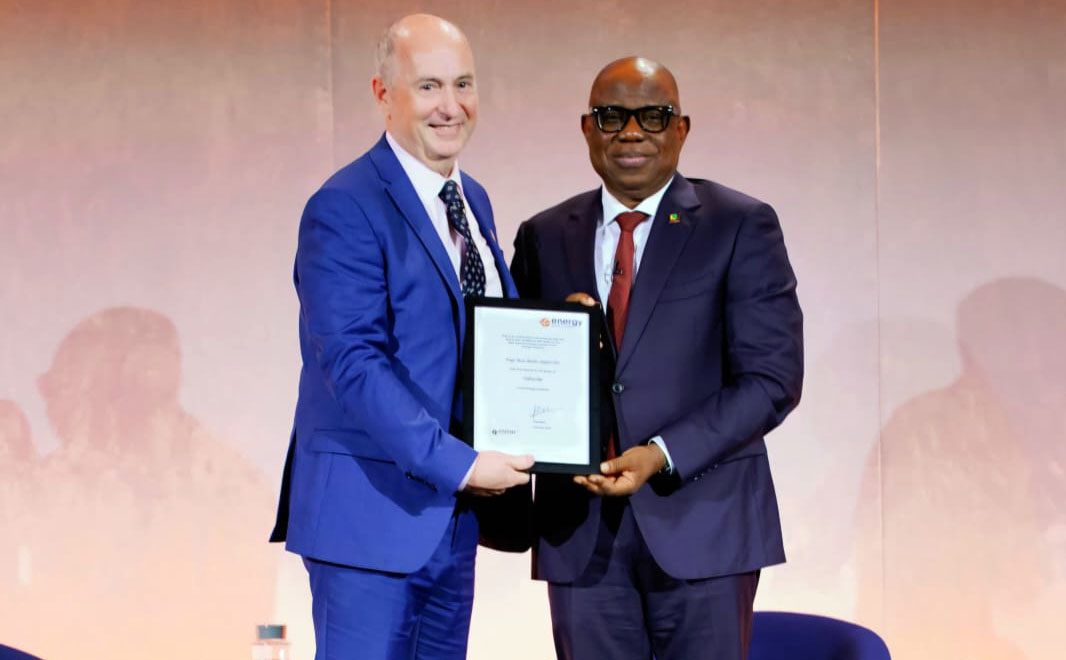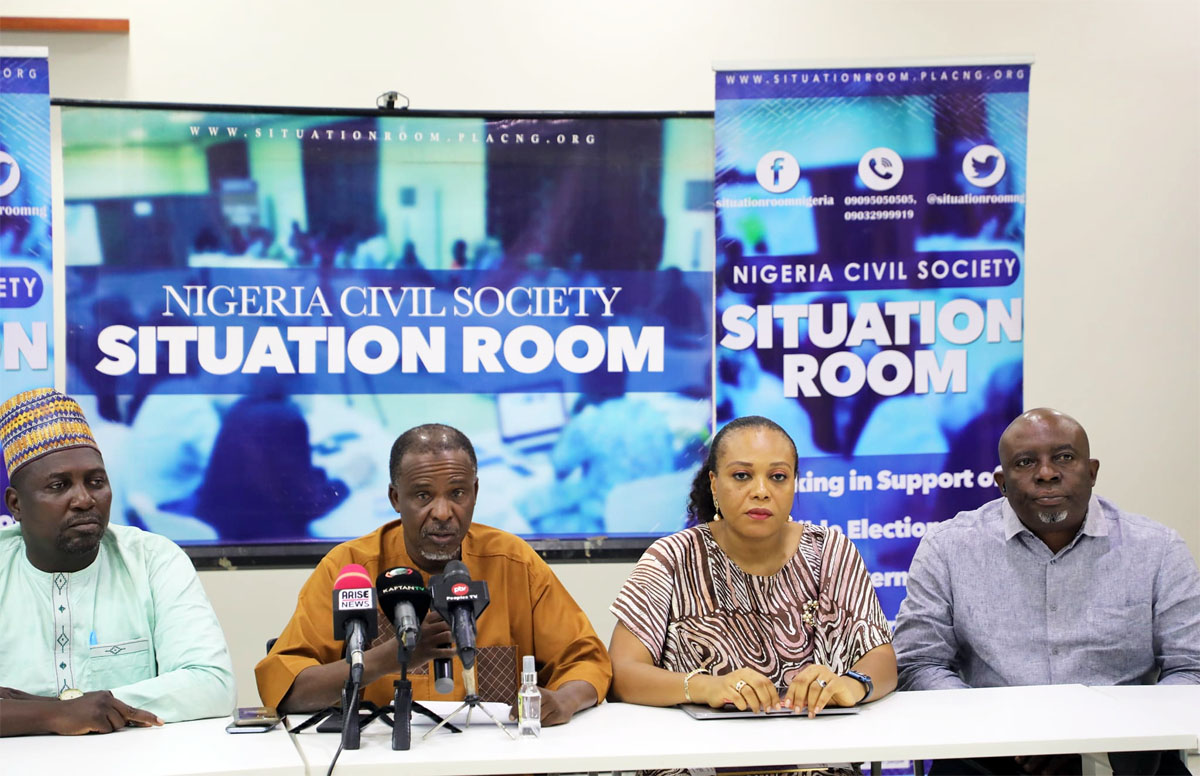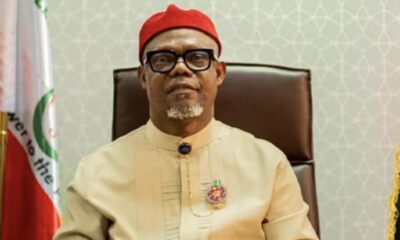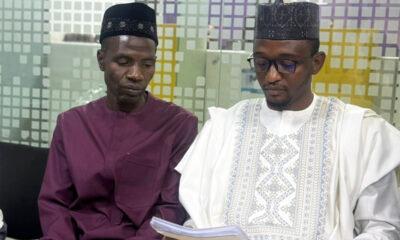News
1,683 school children kidnapped in 8 years in Nigeria – SCI

1,683 school children kidnapped in 8 years in Nigeria – SCI
A report released by Save the Children International (SCI) has revealed that about 70 schools were attacked and 1,683 school children kidnapped across Nigeria between Feb 2014 and Dec. 2022.
The report is entitled, “Education Under Attack: Review and Analysis of Attack on Schools, Teachers, and Learners from the Kidnapping of the Chibok Girls, Borno, Nigeria in 2014.”
The consultant who developed the report, Mr Augustine Mamedu, while presenting the findings in Abuja on Thursday, also said that 184 learners were killed while 88 others were injured within the period.
Mamedu added that about 60 teachers and other school workers were also kidnapped; 14 were killed, while 25 school buildings were destroyed.
He pointed out that since the Chibok incident in Feb. 2014 when about 276 girls were kidnapped, the spate of kidnappings has been on the rise.
He added that the reports also revealed a geographical shift in the kidnappings of learners from the North East to the North West and North Central Zones.
He said that between 2014 and 2022, five schools were attacked in North East, 49 in North West, 11 in North Central, three in South South and two in South West.
READ ALSO:
-
Naira gains at official market, trades 740.67/$
-
Breaking: Tobi Amusan finally cleared of doping
-
Tony Elumelu’s Transcorp takes over Abuja DisCo management
“The report also showed that 28 schools have been attacked in Kaduna State within the period, with 17 schools attacked in Kajuru Local Government Area of the state alone.
“In Katsina State, 99 schools were closed, affecting 30,870 learners,” he said.
The consultant said that the report recommended increased investment in safe schools and the implementation of the SSD across the country and closure of boarding facilities located in communities with no security posts.
The Country Director, SCI, Mr Famari Barro, called for the full implementation of the Safe Schools Declaration (SSD) signed in 2015 to protect school children from kidnapping and other vices.
Barro explained that the SSD was a political commitment endorsed by the Federal Government to protect children, teachers and school facilities from attack and use of school facilities during arm conflict.
He said that globally, attacks on education, schools, children, and their teachers as well as the use of school facilities by security agencies during conflict was on the increase.
He recalled that the Nigerian government had taken steps by domesticating the SSD and pledged to mainstream and implement the declaration guidelines.
The country director, however, said that despite the efforts, attacks on education have remained a challenge in the country.
READ ALSO:
-
UNICAL suspends Law prof accused of sexual harassment
-
Fuel: Each state gets N5bn, truckloads of rice, maize palliatives
-
The 10 highest-paid footballers in the world in 2023
He explained that SCI commissioned the survey to examine attacks on schools, teachers, and learners in Nigeria since the attack on Chibok in 2014.
He said that the move was to find possible solutions from the view of the impacted communities, teachers, and learners.
Barro commended the establishment of the National Safe Schools Response Coordination Center (NSSRCC).
“The initiative was a good step in providing a conducive learning environment for conflict-affected girls, boys, and children with disabilities in situations of violence.
“However, until the children in remote villages, who feel threatened by the rate of violence can attend school without fear, there is still much to be done.
“More needs to be done to prevent attacks, but also to support children and their families, especially with trauma management,” he said.
Responding, the Permanent Secretary, Ministry of Education, Mr Andrew Adejo expressed the ministry’s commitment to ensuring a safe school for every child through the implementation of the SSD.
Adejor, who was represented by Mr Joseph Achede, Deputy Director, Secondary Education, said that the ministry was working hard to address the problem.
1,683 school children kidnapped in 8 years in Nigeria – SCI
(NAN)
News
NNPC CEO Ojulari Receives Prestigious Energy Institute Fellowship in London

NNPC CEO Ojulari Receives Prestigious Energy Institute Fellowship in London
The Nigerian National Petroleum Company Limited (NNPC Ltd.) has earned international acclaim as its Group Chief Executive Officer, Engr. Bashir Bayo Ojulari, has been conferred with the Fellowship of the Energy Institute (FEI), United Kingdom — one of the highest honours in the global energy industry.
The Fellowship recognises senior energy leaders who have demonstrated sustained, high-impact contributions to the advancement of the energy sector. It was formally conferred on Ojulari during International Energy Week (IEW) in London, a leading platform for energy policy, finance, and industry leadership. (punchng.com)
The honour was presented by Andy Brown, President of the Energy Institute, who praised Ojulari’s transformative leadership of NNPC Ltd., highlighting his role in strengthening governance, embedding a performance-driven culture, and repositioning the company for long-term value creation.
Under his stewardship, NNPC Ltd. has implemented investor-focused reforms, enhanced operational excellence, and expanded strategic global partnerships, all contributing to increased confidence in Nigeria’s energy sector. The recognition reinforces NNPC’s ongoing transformation into a commercially driven, globally competitive, and transparent energy company.
READ ALSO:
- FCT Polls: CSO Situation Room Flags Late Voting, Vote Buying, Logistical Challenges
- ADC Defeats APC to Win First Polling Unit in FCT Area Council Election
- Trump Moves to Indefinitely Suspend Work Permits for Asylum Seekers
Significance for Nigeria and Africa
Experts note that the FEI Fellowship is not only a personal achievement for Ojulari but also a major institutional endorsement of NNPC Ltd.’s reform agenda. Being recognised at International Energy Week, which convenes policymakers, financiers, regulators, and industry leaders, positions the company at the centre of critical global energy discussions on sustainability, energy transition, and capital formation.
The award also signals growing international confidence in NNPC Ltd. and highlights Nigeria’s strategic role in Africa’s energy security and global energy transition ambitions. (vanguardngr.com)
Ojulari’s Leadership Achievements
Since assuming office, Engr. Ojulari has overseen multiple strategic reforms at NNPC Ltd., including:
- Driving governance and operational reforms to boost accountability.
- Expanding strategic partnerships and investor-focused initiatives.
- Enhancing execution efficiency across the company’s subsidiaries.
- Positioning NNPC Ltd. as a credible, investment-ready energy enterprise.
These efforts have not only improved the company’s profitability and performance but also strengthened Nigeria’s energy security and market competitiveness. (punchng.com)
Ojulari described the Fellowship as a reflection of collective effort within NNPC and reiterated his commitment to sustainable value creation, global best practices, and energy sector innovation.
NNPC CEO Ojulari Receives Prestigious Energy Institute Fellowship in London
News
FCT Polls: CSO Situation Room Flags Late Voting, Vote Buying, Logistical Challenges

FCT Polls: CSO Situation Room Flags Late Voting, Vote Buying, Logistical Challenges
The Nigeria Civil Society Situation Room has raised concerns over multiple irregularities in the ongoing Federal Capital Territory (FCT) Area Council Elections, citing late polling unit openings, reports of vote buying, and logistical challenges that could affect voter participation.
According to the Situation Room, a coalition of over 70 civil society organisations advocating for credible elections in Nigeria, many polling units opened late, with an average start time of 9:15 a.m., well after the official 8:30 a.m. schedule. Observers also noted low voter turnout in several areas, particularly in AMAC, although queues began forming later in Kuje, Kwali, Gwagwalada, and Abaji Area Councils.
Vote Buying Observed
The coalition reported instances of vote buying, with voters allegedly offered up to ₦10,000 in exchange for ballots in units such as PU008, PU056, PU057, and PU058 in Gidan Mangoro Ward, AMAC. While some of the transactions were open, others were conducted discreetly.
The Situation Room warned that such electoral malpractice undermines the integrity of the election and called on electoral officials, political parties, and security agencies to intervene and prevent further incidents.
READ ALSO:
- ADC Defeats APC to Win First Polling Unit in FCT Area Council Election
- Trump Moves to Indefinitely Suspend Work Permits for Asylum Seekers
- Peller Escapes Generator Fire at Lagos Home, Recalls Earlier Lekki–Epe Scare
Logistical and Accessibility Issues
Observers noted that some voters struggled to locate their polling units after last-minute changes communicated by INEC via text messages. The Bimodal Voter Accreditation System (BVAS) generally performed efficiently, with a one-minute average accreditation time, though malfunctions were reported in a few units including Gwako Town Primary Schools II & IV and PU143, Gwagwalada.
The Situation Room also highlighted accessibility challenges for voters with disabilities, noting that braille ballot guides, magnifying glasses, and other assistive materials were largely absent, even in designated disability communities such as Karimajiji and PU052, Wuse.
Security and Election Conduct
Security personnel, including officers from the Nigeria Police, Civil Defence, Immigration Service, and Fire Service, were present in significant numbers and generally maintained order and professionalism.
Isolated incidents of intimidation and harassment were reported in locations such as Grade 1 Area Court, Rubochi (Kuje); Naharati Sabo School II, Rimba/Ebagi; and PU3, UNG Liman/UNGWAR LIMAN 1, Abaji Central, but security agents swiftly resolved these situations.
Call for Calm and Integrity
The Situation Room commended the INEC FCT Help Desk for promptly addressing reported issues and called on all stakeholders to maintain calm, resist vote buying, and ensure that the will of the people is respected as the polls continue and results are collated.
The report was jointly signed by Mma Odi and Celestine Odo, co-conveners of the coalition.
FCT Polls: CSO Situation Room Flags Late Voting, Vote Buying, Logistical Challenges
News
Trump Moves to Indefinitely Suspend Work Permits for Asylum Seekers

Trump Moves to Indefinitely Suspend Work Permits for Asylum Seekers
United States President, Donald Trump, has introduced a sweeping immigration proposal that could halt the issuance and renewal of work permits for asylum seekers for many years, marking what analysts describe as one of the most consequential shifts in U.S. asylum employment policy in decades.
The proposed rule, released on Friday by the U.S. Department of Homeland Security (DHS), seeks to suspend new employment authorisation for asylum applicants until the average processing time for designated asylum cases falls to 180 days or fewer.
According to DHS data, the asylum case backlog now exceeds 1.4 million applications, with the department projecting that meeting the 180-day benchmark could take between 14 and 173 years under current conditions—effectively creating an indefinite suspension of asylum work permits.
Despite the bleak projections, DHS said administrative restructuring, staffing increases, and efficiency-focused reforms could eventually reduce processing delays. However, officials acknowledged that significant improvements would take time.
READ ALSO:
- Peller Escapes Generator Fire at Lagos Home, Recalls Earlier Lekki–Epe Scare
- Abuja Church Expels Newly Married Woman Over Refusal to Consummate Marriage
- Pastor Sentenced to Death by Hanging for Murdering Landlord in Akwa Ibom
In a statement accompanying the proposal, DHS said the rule, if finalised, “would reduce incentives for frivolous, fraudulent, or otherwise meritless asylum claims.” The department stressed that work authorisation is not an entitlement, but a discretionary benefit granted by the DHS secretary.
If implemented, the policy would generally bar migrants who entered the United States unlawfully from receiving new work permits or renewing existing ones while their asylum claims remain pending.
Limited exemptions would apply only to individuals who alerted U.S. border officials within 48 hours of arrival that they feared persecution, torture, or faced another urgent humanitarian threat.
The proposal forms part of a broader immigration clampdown under President Trump, who returned to office in 2025 after campaigning on stricter border enforcement and tougher asylum standards.
Throughout his campaign and early months back in office, Trump portrayed immigrants and asylum seekers as economic and security burdens, claims that critics argue are not supported by crime or labour market data.
Immigrant advocacy groups, civil rights organisations, and some Democratic lawmakers have criticised the proposal, warning that denying work permits could push asylum seekers into poverty, increase dependence on charities, and drive people into undocumented employment.
Legal experts also expect significant court challenges, arguing that the rule could weaken long-standing U.S. and international asylum protections and undermine due-process guarantees.
The proposal will undergo a 60-day public comment period once it is formally published in the Federal Register on Monday. The regulatory process could extend for months or even years, with the final outcome uncertain amid anticipated legal battles.
Until then, existing regulations governing asylum seeker work permits in the United States remain in force.
Trump Moves to Indefinitely Suspend Work Permits for Asylum Seekers
-

 Politics1 day ago
Politics1 day agoPeter Obi Launches ‘Village Boys Movement’ to Rival Tinubu’s City Boys Ahead of 2027
-

 International2 days ago
International2 days agoCanada Opens New Express Entry Draw for Nigerian Workers, Others
-

 News2 days ago
News2 days agoPolice to Arrest TikToker Mirabel After She Recants False Rape Claim
-

 International2 days ago
International2 days agoEpstein, Ex-Israeli PM Named in Alleged Profiteering From Boko Haram Crisis
-

 metro2 days ago
metro2 days agoOsun Awards 55.6km Iwo–Osogbo–Ibadan Road Project to Three Contractors
-

 Politics2 days ago
Politics2 days agoUpdated: Rivers Senator Mpigi Barinada dies at 64
-

 metro2 days ago
metro2 days agoOndo Monarch Killed as Bandits Strike Akure North
-

 Education1 day ago
Education1 day agoOgun Gov Rewards Nigeria’s Best Primary School Teacher with Car, Bungalow















